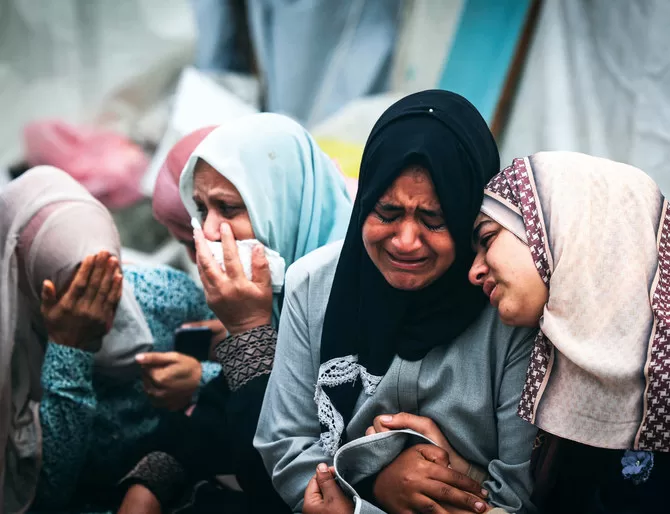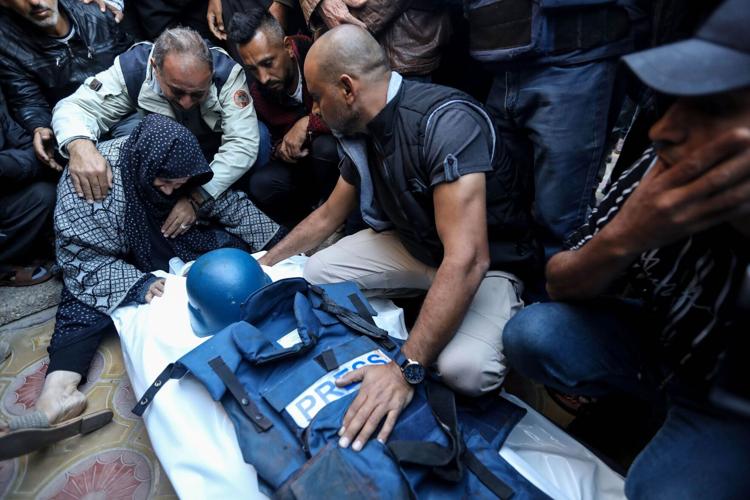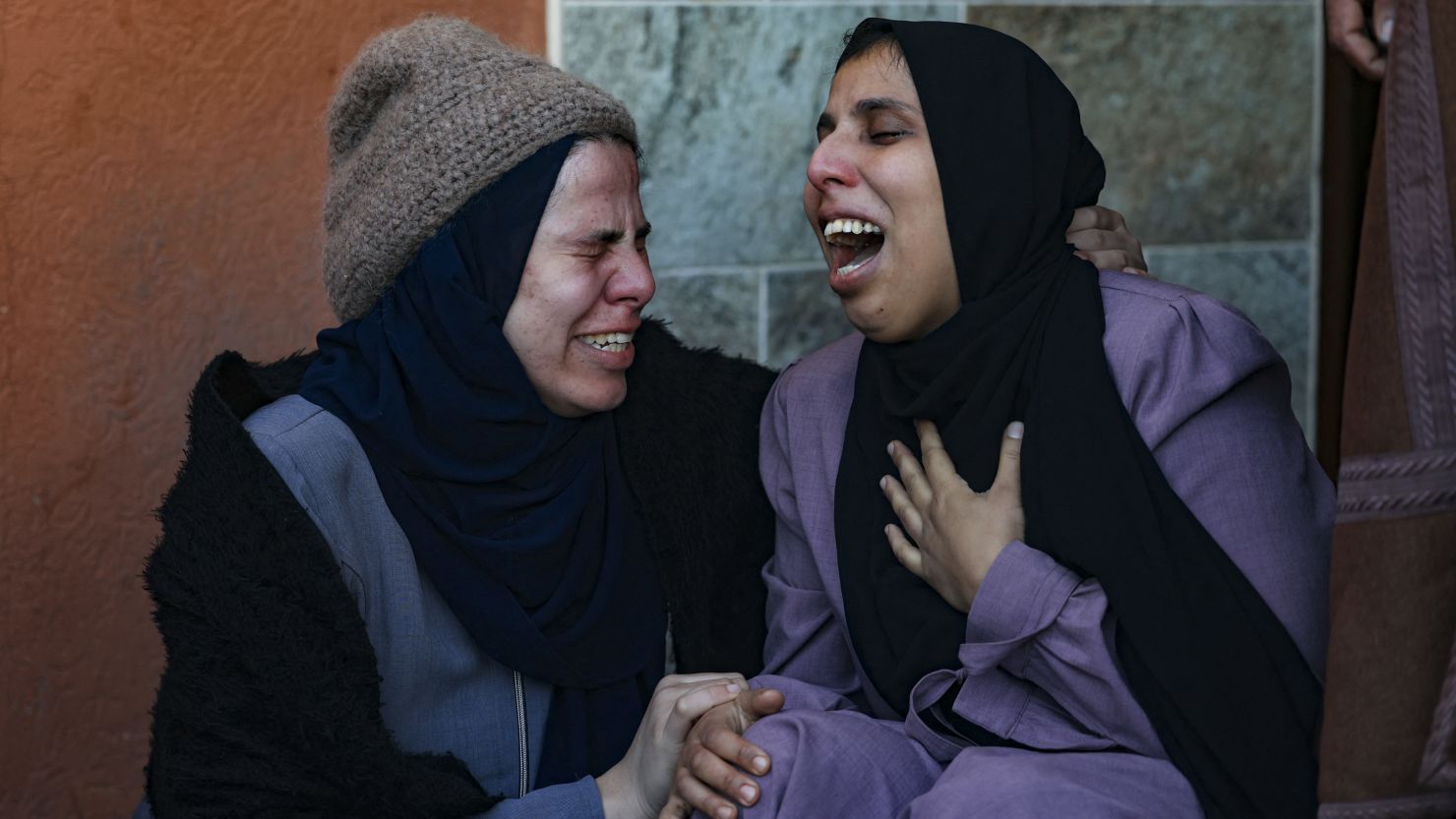
This week, Israel is scheduled to appear before the International Court of Justice in a highly consequential dispute that might ultimately determine how the horrific conflict in Gaza plays out.
This instance is unheard of. According to experts, the United Nations Genocide Convention, which was drafted in the wake of the Second World War in response to the crimes done against the Jewish people during the Holocaust, is being applied to the Jewish state for the first time.
The South African government, which took over from the apartheid state that was declared unacceptable on the global scene thirty years ago, filed the lawsuit against Israel, claiming that Israel had violated the convention by attacking Hamas in Gaza.
Prime Minister Benjamin Netanyahu of Israel has categorically denied the allegation, referring to it as a “false accusation.”
According to Israeli President Isaac Herzog, his nation will demonstrate on Tuesday that it is “using self-defense” and is making every effort to prevent civilian losses in Gaza by going above and above what is required of it in these “extremely complicated circumstances.”
Professor of international law at Tel Aviv University Eliav Lieblich told CNN that the issue is important from both a political and legal standpoint.”The most serious international legal accusation that can be made against a state is one of genocide,” he said. What is known about this case is as follows.
Because it is perpetrating genocide against Palestinians in Gaza and failing to stop genocide, South Africa is bringing Israel before the International Court of Justice, often known as the World Court.
In an 84-page court petition, South Africa stated, “More gravely still, Israel has engaged in, is engaging in, and risks further engaging in genocidal acts against the Palestinian people in Gaza.”
“Because they are intended to bring about the destruction of a substantial part of the Palestinian national, racial, and ethnic group,” South Africa claims that Israel’s actions in Gaza constitute genocide.
According to the report, “the acts in question include killing Palestinians in Gaza, seriously injuring their bodies and minds, and subjecting them to living conditions designed to cause their physical destruction.”
Since October 7, over 23,000 people have died in Gaza, according to the Ministry of Health, which is managed by Hamas.
“Committed with intent to destroy, in whole or in part, a national, ethnical, racial or religious group” is how the United Nations defines genocide.
According to the UN, it was created “partly in response to the systematic murder of Jews by the Nazis during the Holocaust.”
The eight-page submission to the International Court of Justice includes statements made by Israeli authorities, such as Prime Minister Benjamin Netanyahu and members of his cabinet, that South Africa considers to be “expressions of genocidal intent.”
Additionally, citing the need “to protect against further, severe, and irreparable harm to the rights of the Palestinian people,” South Africa has requested the court to impose “provisional measures” requiring Israel to end its attack in Gaza. An injunction or interim order to stop activities until a final decision is made is known as a provisional measure.
Thus far, Jordan, Turkey, Malaysia, and the Organisation of Islamic Cooperation—a coalition of 57 Muslim nations—have supported the cause.
The International Court of Justice: What is it?
The United Nations Charter established the International Court of Justice (ICJ) in June 1945; it is headquartered in The Hague, Netherlands.
While the International Criminal Court, located in The Hague, prosecutes people, this court hears cases involving states. Since Israel refuses to recognize the ICC, the court lacks authority over it. But because Israel ratified the Genocide Convention, the International Court of Justice has jurisdiction over it.
Cases may be presented by UN members as well as those who have consented to the ICJ’s authority. When all of the states have acknowledged their respective jurisdiction, the court will consider the matter. There are fifteen judges on the ICJ, each with a nine-year tenure. The US, Russia, China, Slovakia, Morocco, Lebanon, India, France, Somalia, Jamaica, Japan, Germany, Australia, Uganda, and Brazil are among the nations represented on the current bench of justices. Every three years, five seats are available for election; there is no consecutive term restriction.
In February, four new judges, including Dire Tladi of South Africa, will begin office.
In contentious cases (between two states), such in this case between Israel and South Africa, ad hoc judges may be nominated by the parties involved, raising the total number of judges in the case to 17. Former deputy chief judge Dikgang Moseneke of South Africa and former president of Israel’s Supreme Court Aharon Barak have been appointed.
A final decision may take years, according to experts.
What reaction has Israel given?
The Israeli military is behaving in “the most moral way” and “does everything to avoid harming civilians,” according to Netanyahu, who has responded to South Africa’s thinly disguised accusations of antisemitism by calling the case a “blood libel” by Israel.
And I ask you, South Africa, and all the others who defame us, where were you when millions of people were killed and forced from their homes in Yemen, Syria, and other places? “You were absent,” said the prime minister.

Israel will still go before the court, though.
This is because it ratified the 1948 Genocide Convention of the United Nations, which was formulated in the wake of the Holocaust. Parties that were not directly impacted by the alleged genocide in question may file cases with the ICJ, which is empowered by the treaty to make decisions.
Lieblich stated, “It would be strange if Israel would simply not appear since the court has jurisdiction.” “Since genocide is a serious accusation, states typically want to establish their case.”
According to Lieblich, the political divide in Israel is reflected in the public’s perception of the case. Some see the proceedings as simply another instance of anti-Israel prejudice on a global scale. Many others are upset because they believe that far-right politicians’ careless remarks, which in their opinion don’t reflect genuine policy, are the only thing that made the case feasible.
However, he claimed that not many Israeli mainstreamers are prepared to acknowledge the claims of genocide. “They see the war primarily as one of self-defense against Hamas, whose actions cause widespread, unintentional harm to civilians.”
Israelis are overwhelmingly in favor of the war, according to polls.
Axios said that Israel had organized its diplomats to persuade host countries to support its stance and generate worldwide pressure against the case, citing an Israeli diplomatic cable. It stated that its “strategic goal” is for the court to deny the injunction motion, desist from holding Israel accountable for genocide, and recognize that it is acting in compliance with international law.
According to the message, which Axios referenced, “a ruling by the court could have significant potential implications that are not only in the legal world but have practical bilateral, multilateral, economic, and security ramifications.”
Pretoria is “criminally involved with Hamas’ campaign of extermination against our people,” according to Israeli ministry spokesman Eylon Levy.
In addition, he charged that it supported Omar al-Bashir, the former president of Sudan, who is wanted by the ICC and used unfair criteria.
In a speech published on X on January 2, he declared, “How tragic that the rainbow nation that prides itself on fighting racism will be fighting pro bono for anti-Jewish racists.” Leaders of South Africa, rest assured: you will be judged by history. It will also judge you harshly.
According to Lieblich, South Africa seems to be putting itself in opposition to US supremacy in the global system.
“While it continues the case against Israel, South Africa has opposed the International Criminal Court’s arrest order against Vladimir Putin and has abstained from detaining Omar al-Bashir in the past.” Thus, this is an unambiguous international declaration. This lawsuit is related to South Africa’s vociferous campaign against what it sees as Western “double standards.”
Why does this case matter?
Although the ICJ has previously rendered decisions that are not legally enforceable, these rulings have come from requests made by UN entities like the General Assembly for “advisory opinions.”
In what is referred to as a “contentious case,” in which governments directly file lawsuits against one another, Israel is being sued for the first time in the International Court of Justice.
In an advisory opinion published in 2004, the International Court of Justice (ICJ) declared that Israel’s separation barrier in the occupied West Bank violated international law and demanded its demolition. Israel disregarded that ruling.
According to analysts, the International Court of Justice (ICJ) would be the first to find that a state has committed genocide if it ultimately determines that Israel is directly guilty.

First and foremost, Lieblich stated, “This would be a significant precedent because the ICJ has never ruled that a state committed genocide.” The decision that Serbia was unable to stop militias in Srebrenica from committing genocide was the furthest it went. Such a decision would be novel legal ground in this regard.
While no state is directly responsible for genocide by the court, both Myanmar and Russia have faced provisional measures in genocide cases in recent years.
Every ruling made by the ICJ is binding, final, and unappealing.
However, the ICJ is unable to ensure adherence. For instance, the court mandated that Russia immediately cease its military assault in Ukraine in March 2022. To stop the bloodshed before the case was heard in full, Kyiv, the party who filed the lawsuit, contested the justification for Russia’s invasion and requested emergency actions against Russia.
What would happen if Israel was given a court injunction to stop the war?
Israel is scheduled to appear before the court on Friday in public proceedings to refute South Africa’s claims of genocide.
Although proving genocide might take years, Pretoria has asked the International Court of Justice (ICJ) for an injunction against the Gaza conflict, which could happen much sooner.
International justice specialist and attorney Daniel Machover, who practices in London, told CNN that an interim step has to be a prompt determination made before a final verdict on genocide.
He stated that before the court renders a final decision, South Africa only needs to show that it has standing to bring the case, that it has carried out its obligation to prevent genocide, that there is a “plausible legal argument” that violations of the Genocide Convention are occurring or may occur, and that there is a genuine and immediate risk that residents of Gaza will suffer irreversible harm, necessitating an order from the court for Israel to cease hostilities.
Based on his review of the documents submitted by South Africa, American human rights attorney Francis Boyle, who successfully argued for Bosnia and Herzegovina in two requests made to the International Court of Justice (ICJ) under the Genocide Convention, told Democracy Now that he believes Pretoria will indeed win “an order against Israel to cease from committing all acts of genocide against the Palestinians.”
Boyle stated that the order may be issued during this week’s hearing, using his expertise from the Bosnian case as support.
Lieblich doesn’t think Israel would completely stop fighting if the court decided to halt the conflict. Alternatively, it can criticize the court’s and its judges’ legitimacy, “given that some of them are from states that don’t recognize Israel.” He went on to say that it would also be important if the choice is made unanimously.
“Non-compliance may have consequences ranging from political pressure and harm to reputation to sanctions and other actions by third states or additional UN resolutions,” he said.”How Israel’s major allies would respond in such a situation would likely be crucial.”
While there is a low bar for an injunction, he said, there are two requirements to prove genocide in the main case: proof of specific unlawful acts and proof that these acts were performed with the explicit goal of exterminating a particular group.
“The court required a high threshold to prove such allegations in previous ICJ cases,” he said. Here, South Africa would have to demonstrate that remarks made by some Israeli officials truly represent the state’s “intent” as a whole and that Israel’s actions on the ground were both illegal and directly related to an attempt to dismantle the group as a whole.
Experts predict that the effects of an ICJ verdict may extend beyond Israel. Not only would it make Israel’s closest friend, the United States, seem foolish, but it would even implicate Washington in the purported Genocide Convention violation.
“Even though the South African application focuses on Israel, it has huge implications for the United States, especially President Joe Biden and his principal lieutenants,” said American political scientist John Mearsheimer.
“Why? He stated, “Because there is little question that the Biden administration is involved in Israel’s war.”
Although Biden has admitted that Israel is attacking Gaza in an “indiscriminate” manner, he has also pledged to defend the nation. During the conflict, the US has twice circumvented Congress to provide Israel with military hardware.
Mearsheimer notes that “Biden’s name—and America’s name—will be forever associated with what, aside from the legal ramifications of this, is likely to become one of the textbook cases of attempted genocide.” his behavior.”
According to Machover, other signatories will be legally obligated to comply even if Israel disobeys an ICJ order. Therefore, it would be against the command of anybody to aid Israel at that moment.
“If states don’t stop assisting Israel, we could have global litigation… there will be global legal repercussions,” he said.
According to Machover, the Israeli public may be impacted by the case. He thinks that many Israelis “have not looked in the mirror” and are unaware of how the conflict is affecting the Palestinian population in Gaza.
He believes that the Israeli public will do “some sort of self-reflection” as a result of the ICJ case.
